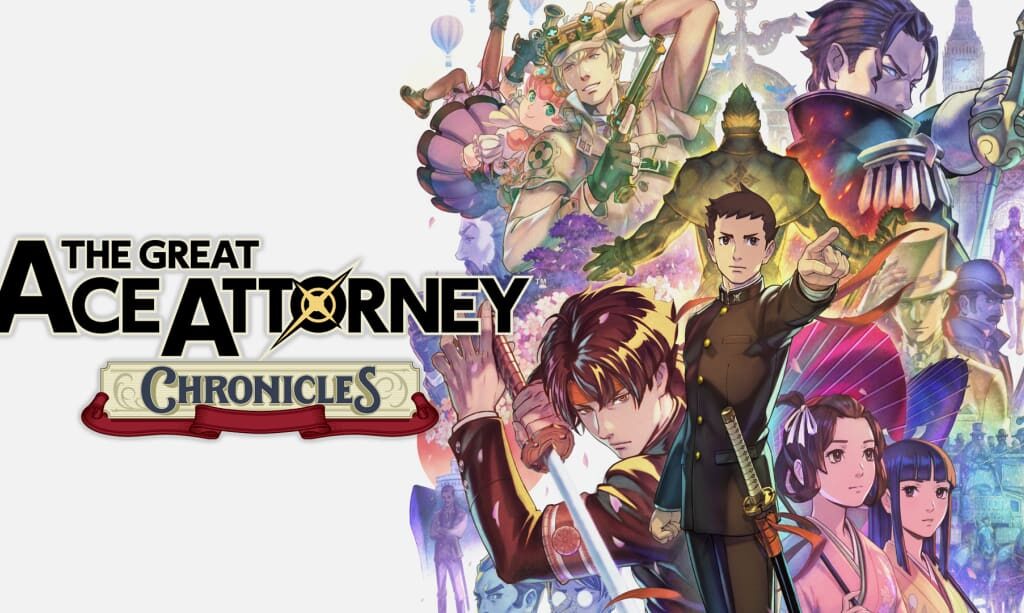Review: The Great Ace Attorney Chronicles
Fans of Capcom’s Ace Attorney franchise – a series of games in which protagonist Phoenix Wright and his associates defend clients who have been falsely accused of murder – have long celebrated the Japanese series’ brilliant take on the court system. Across six mainline games and a handful of spin-offs, players have found justice for their clients in an expediated, idealised law system, in which innocence is swiftly proven by lawyers who double as detectives. The games can be silly – spirit mediums and psychics play a large part – but the real value of these games is in how much value they place on truth and justice.
The Great Ace Attorney Chronicles compiles two series entries originally released for the Nintendo 3DS in Japan, which English-speaking fans had come to believe would never be translated. These two games follow Ryunosuke Naruhodo, a freshly-minted lawyer from Meiji-era Japan who travels to Great Britain to study the country’s legal system, and soon becomes embroiled in a series of interconnected cases. This entry strips back some of the stranger elements of previous games in the series and finds new ways to mix realistic details about the period with some more fantastical ideas.
If you’ve played previous games in the series, you’ll know roughly what to expect, despite the change is characters and setting. Across 10 cases, you’ll split your time between investigating – visiting locations, talking to witnesses, gathering information – and trial segments, where you pick apart testimonies and present evidence to find holes in the prosecution’s argument. It’s very heavy on well-written text, so expect a lot of reading. In this instalment, you’ll also have to contend with a jury, and thanks to some silly legal loopholes most trials contain a section where you need to address them directly to reverse a guilty verdict.
This gameplay model has always been a lot of fun. The climax of each case, where you need to pick apart the truth behind each increasingly convoluted crime, is almost always wonderful, and it’s fun to marvel at how well-constructed each mystery’s solution is. Not only is the writing great, with each character being given a distinct personality and voice, but it’s just very uplifting playing a game where proper justice is served, and the innocent are proven so. It can take a while for the really interesting plot twists to kick in, but once they do, they’re worth the wait.
But what’s most exciting about this particular game is how it manages to balance realism with the absurd. As a young Japanese man visiting Britain in the 1800s, Naruhodo experiences a great deal of racism – both subtle and explicit – during the game. Juries will distrust the foreign lawyer, and the prosecution is openly contemptuous. It makes it more satisfying when Naruhodo proves himself, and his clients, again and again. The game’s treatment of the politics of the era is beyond what the series has managed in the past and makes for some compelling drama where the stakes are often nothing less than the relationship between the two nations.
On the other hand, this is also a game where you team up with a character named Herlock Sholmes – named so because of the litigious nature of Arthur Conan Doyle’s estate – to solve crimes, taking the great detective’s frequently wrong-headed conclusions and correcting them in a game mechanic called the “Dance of Deduction”. This game does an excellent job at mixing the sincere and the absurd, so that all its emotional beats feel real, even if the events depicted are ridiculous.
Each of the two games here is about 30 hours long, but you’ll only feel like you’ve got the “full” story if you play both. Between the two games, the second is comfortably superior, but you’ll need to play through both to get the full and proper experience and experience the catharsis of the final case. This is an excellent remaster of the 3DS games, too, and it looks right at home on a huge TV or the smaller Switch screen.
The Great Ace Attorney Chronicles is a fantastic entry-point into the series, as you don’t need to have played any Ace Attorney games in the series to understand it. Just be prepared to want to play every other game in the series once you’re done.
The Great Ace Attorney Chronicles is available now on PC, PlayStation 4, and Nintendo Switch.
James O’Connor has been reviewing games since 2008.













